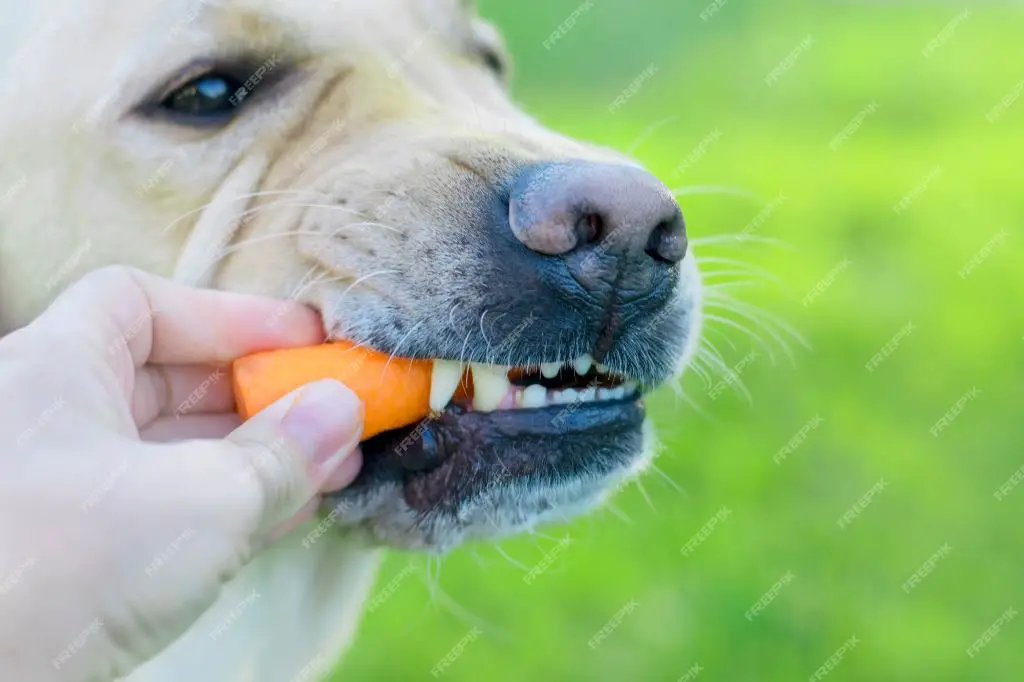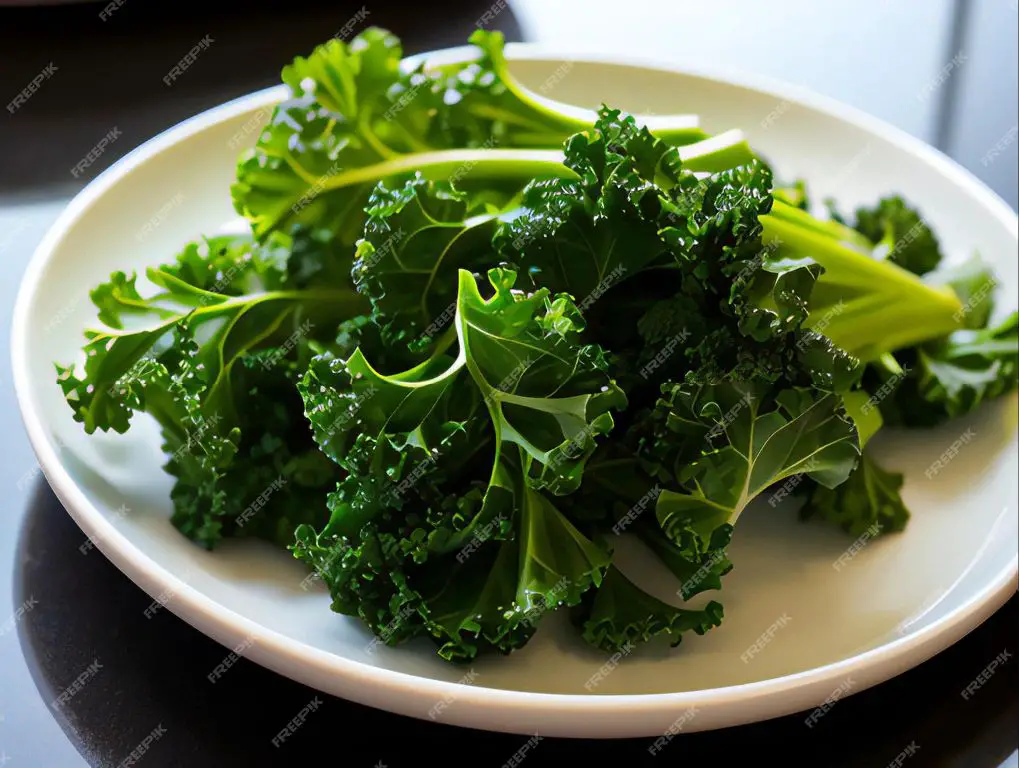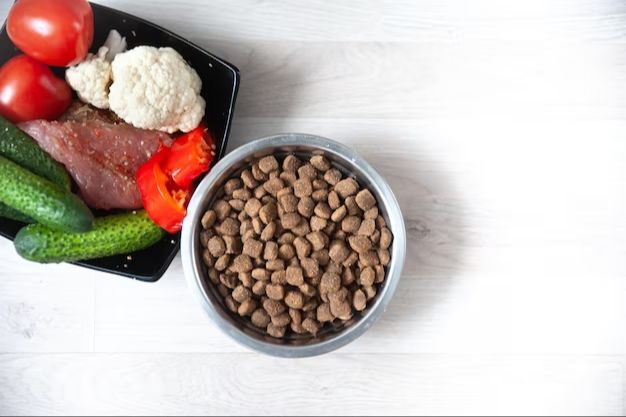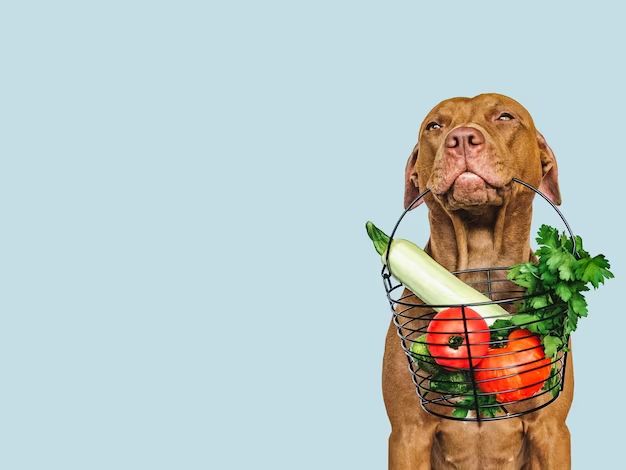Introduction
Adding vegetables to a dog’s diet can provide substantial health benefits. While dogs are primarily carnivores, vegetables are an excellent source of key vitamins, minerals, antioxidants and fiber. Vegetables contain phytonutrients that can boost immunity, reduce inflammation, and fight disease. By incorporating the right vegetables into their diet, dog owners can promote their pet’s overall health, energy levels, digestive and immune function, weight management and longevity.
Veterinarians and canine nutrition experts widely recommend including fresh vegetables as part of a nutritionally balanced diet for dogs. When choosing vegetables for your dog, focus on nutrient-dense produce that provides vitamins A, C, K, iron, calcium and folate. It’s also important to know which vegetables dogs can and cannot eat. With proper preparation and by gradually increasing portions, you can ensure your dog enjoys the vast benefits of vegetables.
Vegetables Provide Key Nutrients

Vegetables are an excellent source of vital nutrients that can benefit a dog’s health. Some of the key nutrients found in vegetables include:
Vitamins – Vegetables contain many different vitamins like vitamin A, vitamin C, vitamin K, B vitamins, etc. These vitamins act as antioxidants, support immune system health, aid in blood clotting, and more.
Minerals – Minerals like potassium, calcium, magnesium, and iron are abundant in vegetables. They help regulate fluid balance, bone health, oxygen circulation, and muscle and nerve function.
Fiber – The fiber found in vegetables promotes healthy digestion and regulates blood sugar levels.
Phytochemicals – Vegetables contain plant compounds like carotenoids and flavonoids that have antioxidant and anti-inflammatory benefits.
Adding vegetables to a dog’s diet provides a nutritional boost beyond the vitamins and minerals found in meat or grains. The wide range of nutrients supports overall health and vitality.
Vegetables for Overall Health
Vegetables provide many benefits for a dog’s overall health, including supporting immune function, digestion, and skin and coat health. Certain veggies contain antioxidants, minerals, and vitamins that play specific roles in keeping dogs healthy and happy.
The vitamin A found in carrots and sweet potatoes helps maintain vision, bone growth, reproductive health, and a healthy immune system. The B vitamins found in green beans and peas support cell function and energy levels. Vitamin C in peppers and broccoli is important for collagen production and immunity. Vitamin E in spinach and sweet potatoes acts as an antioxidant to prevent cell damage.
Magnesium in leafy greens helps with enzyme activation, muscle and nerve function, blood sugar control, and calcium absorption. The fiber in vegetables like pumpkin and squash keeps digestion regular. Key antioxidants like beta-carotene, lutein, and zeaxanthin found in many brightly colored veggies neutralize harmful free radicals to prevent cell damage.
In addition to vitamins and minerals, vegetables provide important plant compounds like carotenoids and flavonoids that have anti-inflammatory effects to promote overall health. Feeding dogs a variety of vegetables with their meals is an easy way to provide balanced nutrition.
Anti-Inflammatory Vegetables

Adding anti-inflammatory vegetables to your dog’s diet can help manage and reduce inflammation. This is important for dogs suffering from inflammatory conditions like arthritis. Some of the best anti-inflammatory vegetables for dogs include:
- Broccoli – Rich in antioxidants like vitamin C and beta-carotene, broccoli can help fight inflammation and cell damage. It’s low in calories and a good source of fiber.
- Green Beans – These are high in vitamin K, which helps regulate inflammatory responses in the body. They’re also packed with fiber and low in calories.
- Kale – This leafy green contains a wealth of anti-inflammatory nutrients like vitamin C, beta-carotene, and omega-3 fatty acids. It’s also high in calcium, iron and antioxidants.
- Peas – A great plant-based protein source, peas are high in vitamin K which is linked to reduced inflammation. They also provide fiber, vitamin C and carotenoids.
- Sweet Potatoes – Rich in vitamin A and beta-carotene, sweet potatoes have powerful antioxidant and anti-inflammatory properties to help reduce swelling and manage arthritis pain.
Adding these vegetables into your dog’s meals a few times a week can provide beneficial nutrients to fight inflammation from within. Just be sure to introduce them slowly and in small amounts.
Vegetables Dogs Can Eat
Veterinarians recommend the following nutritious vegetables for dogs:
- Carrots: An excellent source of vitamin A, potassium, and fiber. Carrots support eye health and the immune system.
- Green Beans: Contain protein, fiber, iron, calcium, potassium, vitamin K, and more. Green beans can aid digestion.
- Pumpkin: Rich in fiber to regulate digestion and packed with vitamin A, potassium, and antioxidants. Pumpkin supports the immune system.
- Sweet Potatoes: Loaded with vitamin A, potassium, fiber, vitamin B6, vitamin C, and more. Sweet potatoes benefit digestive and immune health.
- Broccoli: Provides vitamins K, C, fiber, potassium, calcium, and other vital nutrients. Broccoli is an antioxidant-rich veggie.
- Peas: A great plant-based protein source with fiber, vitamin K, potassium, folate, and more. Peas support muscle health.
Other recommended vegetables include asparagus, Brussels sprouts, spinach, kale, celery, zucchini, bell peppers, and mushrooms.

Vegetables to Avoid
While many vegetables are safe and even beneficial for dogs, there are some that should be avoided. The main vegetables to steer clear of for dogs include:
- Onions
- Garlic
- Chives
- Leek
All members of the allium family, including onions, garlic, chives, and leeks can cause gastrointestinal irritation and could damage red blood cells in dogs. Even small amounts can cause toxicity over time.
Avocados also should not be fed to dogs. The pit, skin, and leaves contain persin, which is toxic to dogs. Additionally, the high fat content can lead to pancreatitis.
Raw green potatoes contain solanine, a compound that is poisonous to dogs. Cooked green potatoes are safer, but it’s best to avoid potatoes altogether.
Rhubarb leaves contain oxalates that can damage the digestive, nervous, and urinary systems. The stalks are not toxic, but are difficult for dogs to digest.
Mushrooms can also be toxic to dogs. Avoid wild mushrooms as well as portobello and button mushrooms.
Finally, while tomatoes are generally safe for dogs, the leaves and stems contain solanine and should not be fed.
How to Prepare Vegetables
Vegetables can be prepared in various ways to make them easy and safe for dogs to digest and enjoy. Here are some tips:
Raw. Many vegetables are fine to give dogs raw. Make sure raw veggies are washed and chopped into bite-sized pieces.
Cooked. Lightly steaming or boiling vegetables can soften them up and make nutrients more bioavailable. Avoid overcooking.
Frozen. Frozen veggies make a convenient option to have on hand. Thaw before serving.
Pureed. For picky eaters or older dogs, pureeing veggies can make them more palatable.
Mixing vegetables into food or making veggie-based broths can entice dogs to eat their veggies. Try various preparation methods to find what your dog likes best.
How Much to Feed
When incorporating vegetables into your dog’s diet, it’s important to stick to recommended serving sizes. The amount of vegetables you feed your dog will depend on their size and weight:
- Small dogs (under 20 lbs): Feed 1-2 tablespoons of chopped vegetables per day.
- Medium dogs (21-50 lbs): Feed 1/4 – 1/2 cup of chopped vegetables per day.
- Large dogs (over 50 lbs): Feed 1/2 – 1 cup of chopped vegetables per day.
Vegetables should make up no more than 10-15% of your dog’s total daily calories. Start slowly when introducing new veggies and watch for any digestive upset. It’s best to consult your vet if you have questions about appropriate serving sizes for your individual dog.
Adding Vegetables to Diet
The best way to incorporate more vegetables into your dog’s diet is to mix them in with their regular food. Chop, grate or purée the veggies into small pieces and mix a tablespoon or two into their kibble or canned wet food. You can increase the amount as your dog gets used to the new flavors and textures. Some dogs may be hesitant at first but will grow accustomed over time.
You can also hide shredded vegetables inside homemade dog treats or store-bought treats with fillings. Stuff the treats with veggies like carrots, zucchini, sweet potatoes or green beans and bake or freeze them. The treats make it easy to deliver extra nutrients and fiber.
When introducing new vegetables, go slowly at first to avoid digestive upset. Try one vegetable at a time and watch for any reactions. Only add small amounts of vegetables per meal or treat, and adjust quantity and frequency based on your dog’s response. With patience and persistence, most dogs will accept and enjoy healthy vegetables as part of their regular diet.
Key Takeaways

Vegetables are an important part of a balanced and healthy diet for dogs. Certain vegetables like carrots, broccoli, and green beans provide essential vitamins, minerals and fiber. Vegetables help improve digestive health and can have anti-inflammatory benefits.
The most dog-friendly vegetables include carrots, green beans, broccoli, sweet potatoes, spinach, cucumbers, and pumpkin. It’s best to avoid garlic, onions, avocados, grapes, raisins and chives. Introduce vegetables slowly and make sure they are cooked properly and cut into bite-sized pieces before serving.
Adding a few tablespoons of vegetables to your dog’s meals a couple times a week can provide important nutritional variety. Consult your vet for specific advice on the best vegetables for your dog’s health and breed size. Overall, incorporating vegetables into a dog’s diet helps provide valuable vitamins, antioxidants and nutrients for their health.